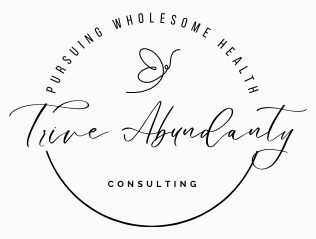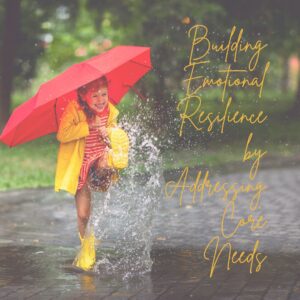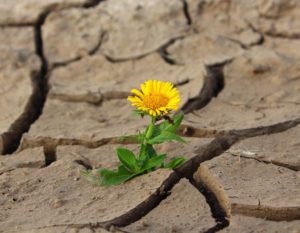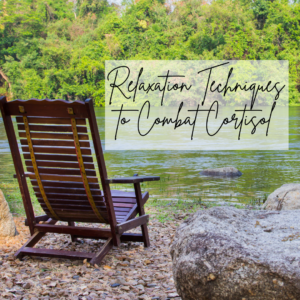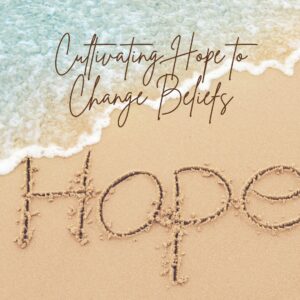This is post 32 in the Living Fully Alive blog series. For the best learning experience please consider reading the posts in the order they were published.
This post continues looking at how to take ownership of our situation and becoming powerful. Following are different ways to take ownership of our circumstance and start moving out of victim thinking.
1. Find the good in the circumstance.
Every situation, trial, circumstance holds within itself an opportunity to learn something. James 1 tells us to count it exceeding joy when we hit trials. It’s because he knew about the gifts these trials hold hidden. Those trials form, refine and grow us if we let them. We will be better off afterwards than we were before, if we embrace the situation and go looking for the gold in the mud instead of bemoan being caked in mud. 2 Corinthians 4:16-18 also speaks into that. Oh, to keep our eyes on the things that aren’t easy to see because they are invisible!
So no wonder we don’t give up. For even though our outer person gradually wears out, our inner being is renewed every single day. We view our slight, short-lived troubles in the light of eternity. We see our difficulties as the substance that produces for us an eternal, weighty glory far beyond all comparison, because we don’t focus our attention on what is seen but on what is unseen. For what is seen is temporary, but the unseen realm is eternal.
This verse sounds so easy. I am going to share an example from one of my trials, where I learned to look for the gold. After a visit to the naturopath revealed that I had leaky gut and was going to be reduced to eating a very limited assortment of foods if I was going to heal from it, for a very long time, I felt a bit overwhelmed. You start running out of new ideas to prepare the same few foods, and you start to wonder, how come so many other people are abusing their guts way worse than I ever did and don’t end up with leaky gut. I don’t blame anyone for feeling sorry for themselves. But I decided it could be worse. I could have no food at all. I might have no money to make the only foods that my stomach could handle at the time. I ended up choosing to be grateful (more on that later). I allowed myself to get fascinated by the whole idea of healing conditions with food, and I learned so many things I was later able to pass on to others. I gained understanding and compassion for others who were having allergies, intolerances and limitations. I was even able to bless others who had special dietary needs by making them wholesome foods that would contribute to their healing, which I would not have been able to do if I hadn’t put all that focus into learning all I could learn about this particular subject. And to top it all, I am so much healthier now than I was before, am able to prevent many other future issues from happening by taking charge now, and I am even teaching nutrition to others. Abi said I can claim as many gifts from each trial as I want to. That sounds crazy until you realize, you don’t find stuff unless you’re looking. How much have I found because I have searched? How many things have you found because you chose to look?
In Abi and Justin’s case, they found themselves in the same situation their parents had been in years before, and it scared them because of how it hurt their marriage. But then they realized they can choose to let this situation impact them powerfully. They saw they had a chance to allow God to redeem what had happened in the previous generation by allowing God into the circumstance and ask him where he is in it. Where is the gift in this painful repeat situation? They decided to face the inner heart battle that the previous generation had not been able to face. They looked on the inside at what they could do rather than on the outside at what was out of their control. The reason it is so valuable to identify our fears is because we often repeat what we are afraid of, even if we aren’t aware of what that is. What feels like it will take us out, what seems to have more power over us than we do, can be disarmed when we look for the gift.
Among many, one central gift is that I have a choice to look for where I do have power in the situation and power up to make a new, different and more powerful decision than in the past. When you find yourself in any hardship, look up long enough to find where the gift is for you. When you find it, look for another. It will make the trial much more endurable and ends up making it worth it too.
We will do well to adopt the stance that life is not going to happen to us – we are going to happen to life. It all has to do with positioning ourselves inside the challenging situations to lean into the pain rather than run from it. Embracing it and walking through it will always bring transformation instead of destruction, no matter what happens that is out of my control.
This is going to get more doable now that we have a way to be more self-aware. We can identify what triggers may be activated by a situation and recognize that if we are triggered, it means some pain that was unresolved in the subconscious has come up to the surface through this trial, and it is an opportunity for me to heal that pain properly and walk away from the trial freer and more healed than I went into it. Trials can target triggers, beliefs, coping mechanisms, fears… all we have to do is stop fretting over the issue outside of us long enough to discern what it is inside of us that can be served by this. It turns our perspective from “I have to endure this situation” to “I get to overcome this, I get to deal with my fears and become free”.
Just remember, God does not create trials so he can give you gifts. But he does promise to turn everything into a gift for us.
Romans 8:28 So we are convinced that every detail of our lives is continually woven together to fit into God’s perfect plan of bringing good into our lives, for we are his lovers who have been called to fulfill his designed purpose.
Being perfectly good and perfect, he does not need to stoop down to conflict and evil to give us good things. He is the redeeming one. He gives beauty for ashes, joy for mourning. Don’t allow trials to make you doubt his goodness – ever.
2. Look for what choices are available
Viktor Frankl is another person from history who teaches us how to remain powerful. He was a prisoner in concentration camp during the second world war. This is what he had to say about choice. “The one thing you can’t take away from me is the way I choose to respond to what you do to me. The last of one’s freedoms is to choose one’s attitude in any given circumstance.” “We who lived in concentration camps can remember the men who walked through the huts comforting others, giving away their last piece of bread. They may have been few in number, but they offer sufficient proof that everything can be taken from a man but one thing: the last of the human freedoms – to choose one’s attitude in any given set of circumstances, to choose one’s own way.”
It is kind of hard to stay in self-pity mode when you hear such a statement!
He and his fellow inmates could have chosen to agree with despair, doom, hopelessness, bitterness, etc. Yet they refused, teaching us that we don’t have to give in. I believe people like him are part of the great cloud of witnesses mentioned in Hebrews 12 even though they weren’t alive when Hebrews was written.
If I feel like I have no choice, I need to think again. Frankl had so many less choices than we do, and yet he found things to choose other than what the obvious one would have been.
Abi mentioned that she has clients who are stuck in feeling like they have no options to choose. I had to laugh when she gave examples of some of the things they could have done when faced with a two hour verbal assault by someone else: plug your ears, talk to the hand, run out the door, pretend to have a heart attack, scream like a little toddler…. To be clear, she did state that not all of those where healthy options, but she wanted to break the belief that there aren’t any options to choose from.
The truth is, often we don’t see options because we don’t like them. Maybe they would be too costly or painful, scary or compromising. I believe making lists of options for situations where we feel we have no options is a great idea. I will make a list and recruit others to help me see what I can’t see.
In general, here are a few things I always have the freedom to choose no matter what is happening. I can choose to pray, I can choose to be compassionate to myself, I can choose to praise and worship God in the valley, I can look for how I can give, I can choose to keep hoping, dreaming, loving, believing. I can choose to speak up, I can choose to be honest, I can choose to challenge my own rules, I can choose to not abandon. None of those things are easy or fun, but they are powerful things I can do to stand up in defiance against the lie that says I can’t do anything about this.
Even in my example at the beginning of the post about the team project, I didn’t like the option of taking a bad grade, but I was still choosing by not saying yes to that option. This brings up a good point that was made in class, when we choose, we actually choose based on the consequences and which one we fear the most. Usually it is that our fear of one of the consequences is bigger than all the others that drives our choice. In my case, my fear of having a bad grade was so big, I didn’t even really see the other options. What I chose was the one way I had the best shot at avoiding getting a bad grade.
Do you ever feel like you need a little cricket speaking to you when you are facing decisions, to make you aware of what the consequences are for each and what fears are attached to those, so you can make a more informed decision? In reality I have someone much more powerful and wise than a cricket. I just need to pay attention to Holy Spirit and get into the habit of having a dialogue with him before making decisions.
Abi gave another example where choice was influenced by the lack of acceptable (to her) alternatives. She had a job that was very demanding. It took her a lot of effort to do it at the standard she had set for herself. But it was taxing her. She had the option of backing off a little and do the job at a less intense level, which would still have been acceptable to her employer. But she would have rather quit than not given her best, which is what she did, she left the job. For her, doing the job at a manageable pace was not an option. It was a rule she had made for herself. She determined that she still agreed with that rule. She could have modified the rule. There are probably some performance or perfectionism roots behind that rule, at least I think there are for me, because I have a similar work rule… but she also had the choice of leaving that job. The key is that we own what we choose. She could have whined about having had to leave the job, but she knew she was making a choice, using her power to do so and owned it.
I had an opportunity to teach a class once that could have done a lot of good for people’s health. However, as the time came closer to teach and I was sharing more of the intended content for each lesson, I was finding myself being censored by the supervisor. I was suddenly told what I could and could not teach in the class. I did not take being censored well. I probably got triggered because it felt like manipulation, and that is one of my triggers. I did just what Abi did; if I could not teach it in the best way, with the most accurate presentation of the topic, then I chose to not teach it at all, rather than teach a watered-down version of it. I know it was a two-level issue. There was the issue of the content and then the issue of the trigger. I chose not to be controlled by someone else’s idea of what was acceptable, but in the process I also now realize that I said no to an opportunity to influence my prospective students with at least what little good stuff that I would have been allowed to teach. I’m not sure I would do it differently now, but it is interesting to suddenly see more options than I saw then.
3. Surrender
Surrender is our third way to find our power. Sounds a little conflicting, doesn’t it? Abi began explaining it by defining that in surrender we don’t give up our desires, but we give up our beliefs that we can only be happy when our desires are fulfilled. Some examples are: ‘I can’t be happy until my husband does this.’ ‘I can’t be happy until my children do that.’ ‘I can’t be happy until my issue is healed.’ ‘I can’t be happy until I reach this.’
Do you suspect you may have any such beliefs? The idea of surrender is that if I allow something external to determine my happiness, then I will always be powerless. But if I surrender and accept that some things aren’t the way I would like and still can find happiness in the unfulfillment, then I have power back. Abi mentioned a friend who had gotten very specific details about a house. I am not sure if it was in a dream or something else, but as she was house hunting and kept not finding those details in the homes she was looking for, she found herself becoming dominated by this external stuff, and she realized she would choose to be happy in a house that did not have those details, trusting that the time would come. In other words, she surrendered what she thought was to be her next house and accepted that she may be in a different house first. We can be happy in the now, when we surrender. Truth be told, not surrendering just ends up causing more pain. But if we surrender to what is in the moment, we can begin looking for the gift. If we don’t surrender, we continue fighting a situation we can’t change.
God, grant me the serenity to accept the things I cannot change, the courage to change the things I can and the wisdom to know the difference.
A big component of surrendering is acceptance. If we accept the season, we lessen our torment and gain some peace. The reason we sometimes resist surrender is because of the mistaken belief that if we surrender then the thing we hoped for or wanted won’t ever come true. Abi’s friend decided she can be happy with the house she has now, and trust that the one she dreams about will come along when it’s the right time. We don’t have to be dissatisfied in order to bring change to our circumstances.
Paul confirms that this is a good way to live. If I had been Paul, would I have fought about how a shipwreck is not ‘legal’ since God promised to protect me from attacks instead of accepted the situation and started to look for the opportunities of finding gifts in the middle of it? Paul has gone through so many extreme trials, his words bear a lot of weight.
Philippians 4:11-13 I am not saying this because I am in need, for I have learned to be content whatever the circumstances. I know what it is to be in need, and I know what it is to have plenty. I have learned the secret of being content in any and every situation, whether well fed or hungry, whether living in plenty or in want. I can do all this through him who gives me strength.
Another way to pray the serenity prayer could be as follows:
God, grant me the serenity to stop beating myself up for not doing things perfectly, the courage to forgive myself and acknowledge I’m working on doing better, and the wisdom to know that you already love me just the way I am.
Gratitude is such powerful tool anywhere but especially in the context of surrender and acceptance. We can find ways to love our lives. We can choose to be grateful while we wait for breakthrough. If I choose gratitude I get my power back. Ungratefulness means I give my power away.
You have probably heard a lot said about practicing gratitude. I like to look for it by looking for how I see God’s goodness. It’s just another way for me to look for things to be grateful for. A couple of friends and I post goodness reports most every day, and when one of us doesn’t, another will not be long to point out the absence. It’s wonderful and such a beautiful way to become vulnerable and share life with each other on a deeper level. I hope you can do this with someone in your own life.
We heard about the story of a homeless man who decided to start being grateful. At the time he only owned one pencil. He began being grateful for that pencil. We didn’t get details about how it progressed from there. I could imagine seeing him get powerful by just thinking about what he could do with that pencil, how he might begin to write for instance, and that is something to be grateful for. The trap some of us sometimes fall into is being grateful for stuff and stop there. But there are so many more things we can be thankful for that can’t be owned or touched. This homeless man realized he had more than a pencil to be grateful for and ended up becoming a millionaire. This isn’t a result that everyone will reach, but we will be millionaires on the inside when we are filled with gratitude in the roughest circumstances.
When we use our power the wrong way, we fight stuff, even if it’s with good intentions, that is actually past saving. Sometimes that happens with divorces. Sometimes the powerful thing to do is stop fighting the divorce and accept that the spouse simply does not want to fight for the marriage too. The way we can choose to be powerful in such a situation is to focus on what we can do internally. We can choose to bless the person who is giving up on us. We can forgive them. We can bless them with good things. We can decide not to be destructive or vindictive. And we can begin to trust God for a good future.
Another example of acceptance is in sickness. Sometimes no amount of will power or faith is going to get us healed. Sometimes we simply can’t get off the couch. By accepting that we aren’t well doesn’t mean we have to give up our desire to be healed. But by accepting it we can find ways to thrive while we are not healed. For a season, I was in pretty bad Adrenal Fatigue to where I was unable to go to evening meetings because the consequences would hurt me for days and I simply needed to be in bed super early. If I had kept fighting it, not only would I have continued to prevent healing, I would have continued to make it worse. Instead I accepted that I was going to miss out on events and opportunities to see people, such as at evening Bible studies, but I found ways to thrive anyway. I began a Bible study group that was online, and everyone could post on the site when it worked best for them. There were other things I chose to do, but I just mentioned this one as an example of how I found ways to thrive despite the season of limitations.
I will cover the other steps for breakthrough in the next post. For now, if you are ready to tackle this topic, here are some suggestions to make this personal.
Look at a trial from your past and find what gifts you ended up getting from that trial.
Find the gift in a situation you are currently struggling in.
Make a list of other choices you have in a situation where you feel trapped.
Recognize where you have been trying to use your power externally rather than internally and surrender that place so you can start looking how to thrive internally.
Start a gratitude journal or document and commit to add to it frequently.
To learn more about the Living Fully Alive course, please click the hyperlink.
